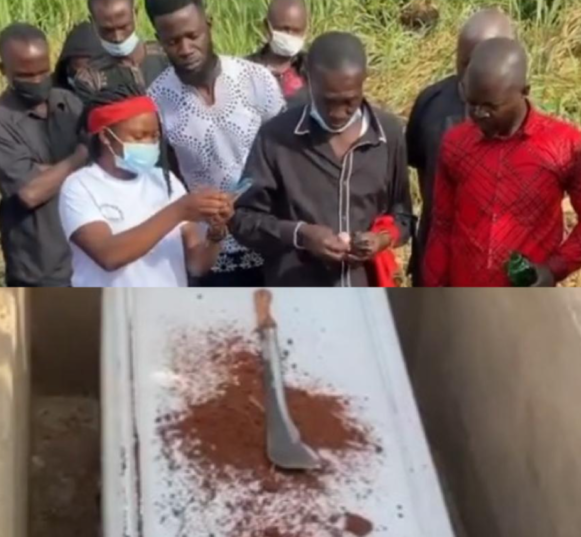Some nursing, midwifery exam candidates using ‘menstrual pads’ to cheat – Dr. Yakong

But some candidates come out of the body search ‘clean’ and they go on to pass the examinations by use of forbidden materials hidden in their private parts as menstrual pads and sneaked into the examination halls.
This ploy is among some acts of examination malpractice the Dean of the School of Nursing and Midwifery at the University for Development Studies (UDS), Dr. Vida Nyagre Yakong, has identified as emerging threats to quality healthcare delivery in Ghana.
“There is a particular paradigm shift that is emerging among trainees all over. This shift is from quality to quantity and from pursuit of knowledge to pursuit of lack of appreciation and respect for knowledge but must earn a certificate. Many training institutions witness an upsurge in unprofessional and unacademic conduct during examinations.
“Students’ engagement in examination malpractice has become so common and, to some extent, normalised among students. They enter examination halls with phones containing content for examination and wrapped in papers and used as menstrual pads,” she said.
She was addressing stakeholders as a keynote speaker at a graduation and matriculation ceremony held by the Nursing and Midwifery Training College at Zuarungu, Upper East Region, on Saturday. 25 November 2023.
The ceremony was themed: “Quality Nursing and Midwifery Education: The Role of Stakeholders.”
The dean continued: “Some download artificial intelligence apps in their phones that find answers online for their questions. Some write content under their dresses and on their thighs to copy. Such students risk cancellations of their papers, rustication or even dismissals. I find this to be an embarrassment to the profession that values truth, hard-work and academic excellence.”
Nursing and Midwifery politicised
Besides her concern about examination malpractice at nursing and midwifery training institutions in the country, Dr. Yakong also expressed worry about stakeholders’ interference in the affairs of the institutions.
“Instead of these unprofessional and unethical behaviours to be condemned, we rather have some politicians, some members of management of the institutions and community leaders, including chiefs, stand in the way of ensuring quality education by asking that such students remain unpunished.
“Heads of institutions receive countless calls from some people who should have known better, asking for favours to free such students, and labelling them as wicked when they stand their grounds to ensure the right thing is done. The students who should have been ashamed of their misconducts also issue death threats to examiners and invigilators who caught them copying,” she noted.
The dean told the gathering the collective dream of producing nurses and midwives of high value, if some stakeholders continued to “serve as barriers to quality education instead of facilitators”, would not be achieved.
“It is a source of worry when quality education in Nursing and Midwifery is politicised,” she stressed. “As stakeholders we need to rethink the implications of our role in this journey.”
Training institutions need freedom to select qualified students
In addition to academic dishonesty and interference by stakeholders, Dr. Yakong also cited admissions offered through “protocols and political pressure” as another major factor contributing to the falling standards of education at health training institutions.
“Mr Chair, another challenge that is a threat to quality education is the calibre of students selected for admission into the programmes. Most students are admitted based on protocols and political pressure. These students come in with some perceived entitlement because of their affiliations to politicians.
“They have the attitude that says ‘I must pass examinations even if I do not study’. This results in poor academic performance and the issue of examination malpractice sets in. We need to revisit this aspect of our admissions processes and give training institutions the freedom to select and admit qualified students in order to maintain the standards needed to ensure quality education of nursing and midwifery in Ghana,” she stated.
According to her, the nurses and the midwives trained in Ghana had been “the most highly sought for outside this country” because the education they received was better than the tuition offered their counterparts in other countries.
While touching on the incomparable demand for Ghanaian-trained nursing and midwifery professionals overseas, the dean also highlighted the need for the country’s training standards to be improved and sustained.
Things nurses, midwives must avoid when on duty
Addressing the gathering, the principal of the school, Michael Yidana Mantamia, reminded nurses and midwives of things they should avoid while on duty.
“Please, don’t have earpiece in your ear when you need to provide service to clients. It is unprofessional. Don’t make calls when you need to be attending to clients. It is negligence. Don’t shout at clients when attending to clients. It is unlike nurse.
“Don’t appear shabby when attending to clients. It doesn’t give an environment conducive for healing. Don’t go on social media when you have to be attending to clients. In nursing, time is not only money, but time is life. Be punctual and regular at your work,” said the principal.
Recently, the Ghana Registered Nurses and Midwives Association (GRNMA) revealed than more than 4,000 nurses left Ghana for Europe between January and July 2023. The association blamed the exodus on poor conditions of service in the country.
“I plead and admonish that let us build our own country even as we build other people’s countries. Be compassionate, caring and professional. Always remember that you are there to care for your patients and that their needs should always come first,” remarked the principal.
513 students matriculated and 202 graduated at the event, where the principal also hailed Dr. Yakong, describing the UDS dean as a major influence in his life.
“Our keynote address speaker, Dr Vida has made me who I am today. A very resourceful person, very humble, intelligent. I studied under her. She took me through my thesis. And if you see me here, it’s through some people like Dr Vida Yakong,” he said.
The Upper East Regional Director of Health Services and chairman for the event, Dr Samuel K. Boakye-Boateng, spoke similar words at the ceremony.
“The keynote address was very comprehensive. In fact, I consider myself to be a bold person; but I think this woman is bolder than me,” Dr Boakye-Boateng stated. “She said so many things. She spoke to everybody.”
The keynote address turned the spotlight on several entities. They include: educational institutions, faculty and mentors, students, healthcare institutions and clinical preceptors, government and regulatory bodies, healthcare professionals and alumni as well as community and patients.
Source: starrfm.com.gh





